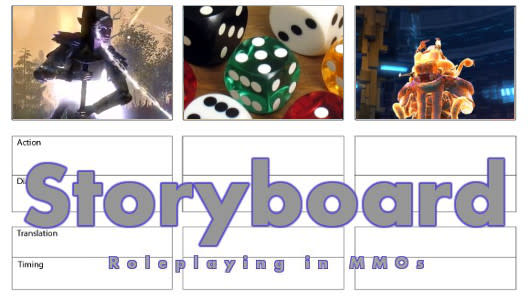Storyboard: Don't fight with /random
Most of my Storyboard columns center on larger issues, providing advice in some way. This one does not. This one is purely about one of the elements of roleplaying in MMOs that I particularly dislike: using in-game random rolls to determine the outcome of actions during tense scenes (or out-of-game rolls in games that don't support /random or /roll or something similar).
This is a time-honored practice in MMOs, but I've never had many nice things to say about it, to the point that I wrote an entire column about dueling without even discussing it. In practice, it makes sense, casting otherwise unresolvable situations back to the realm of tabletop gaming. What's not to like?
Lots of things. Resolving conflicts with random dice rolls is unsatisfying and to be avoided at all costs. And if you want to compare it to tabletop gaming, you're making a lot of logical leaps that don't hold up under scrutiny.

How tabletop RPGs work
Some of you already know this, and some of you don't. You can feel free to skip down to the next section already if you do know it, but if you're not sure of the difference, maybe you should keep reading.
There are a lot of tabletop systems, but pretty much all of them have a few points of commonality. First of all, your character has certain abilities. These abilities are rated in some way, like "Knives +3" or "Interrogate 3" or "Spot Hidden 67%" or "Fawning Over Fashion: Good". When you have to test those abilities, you use those ratings to determine how likely you are to succeed.
How you resolve that varies between games, but the point is that this is all tied directly to character statistics. More to the point, these statistics are designed to be balanced at the start of play so that no one gets to be just plain better than everyone else. Sometimes players will get to play more advanced characters for various reasons, but even then, there are usually elements of specialization. No one is equally great at everything, even though more experienced characters will have developed several more skills than newer counterparts. The whole thing is balanced in theory.
In practice, the guy who spent a bunch of points on combat skills is probably going to be more effective than the guy who spent a bunch of points on learning dead languages, but not always. Call of Cthulhu exists for a reason, after all.

How MMORPGs do not in any way facilitate this
Do me a favor. I want you to go log into World of Warcraft and create a brand-new level 1 Mage. Write down your Intellect stat. Then I want you to log in on your highest-level character that has no use whatsoever for Intellect. Check the two stats. See who winds up higher.
So who's smarter? I know that my level 78 Warrior is apparently smarter than any starting Mage with her Intellect of 31. Does that sound right to you? How about if I put her next to a Mage of the same level and then let you know that my Warrior is an alchemist by trade, well-versed in several languages, trained as a Warrior due to a natural disinclination toward magic? Who's smarter?
The answer is that it depends entirely on the characters, of course. We all realize that the numbers for our stats don't represent actual character capability, in no small part because they just stack upwards. In Dungeons & Dragons there's an upper limit on Strength for humans, and while magic can push you a little higher, you're still within a set scale. In World of Warcraft the only limit on your Strength is how high you can push it from gear and points related.
Not all MMORPGs focus their statistics solely around combat, but there are always things that stats don't cover and odd things that they do. Final Fantasy XI has Charisma, but it doesn't have any stats for various sorts of Charisma, much less for obscure knowledge. Final Fantasy XIV has multiple crafting stats, but it lacks anything about Charisma this time around. And in both cases, you put on more equipment that boosts these stats constantly, making them useless for metrics.

Rolling bones for nothing
You see the fundamental problem, I'm sure. The stats of MMORPGs are tuned to the needs of a video game (make it go higher) rather than the needs of a tabletop game. Randomly rolling essentially comes down to flipping a coin and determining who wins. It doesn't matter if one character is an expert fighter and the other is a rank novice; putting it in the hands of a random roll removes any of the drama inherent in the outcome.
The obvious solution is to assign people skills of some kind and put together tabletop characters, but that has problems, too. Roleplaying in MMORPGs allows for assembling characters that may well not balance nicely according to a game's schematic. How do you balance the character who has been around for two years but is still an in-character novice with the month-old character who is supposedly older and more experienced? Who gets more points? How do you handle these things in a way that doesn't just come down to arbitrary fiat?
In concept, rolling introduces an element of random chance, but random chance is also profoundly unsatisfying. When two characters are coming to blows, for training or for evaluation or for genuine conflict, there's a sense of drama. You want to see a master swordsman and his long-standing rival clash and struggle, not to have one of them swing and the other one randomly forget how to fight and impale his own foot.
Might there be better solutions for this sort of resolution? I think so. You'll be here in two weeks to hear all about it, since next week I'm going to discuss ruining your own RP events. Until then, you can leave comments down below or send them along to eliot@massively.com.

Every Friday, Eliot Lefebvre fills a column up with excellent advice on investing money, writing award-winning novels, and being elected to public office. Then he removes all of that, and you're left with Storyboard, which focuses on roleplaying in MMOs. It won't help you get elected, but it will help you pretend you did. If you need a refresher, check out the Storyboard Library.


